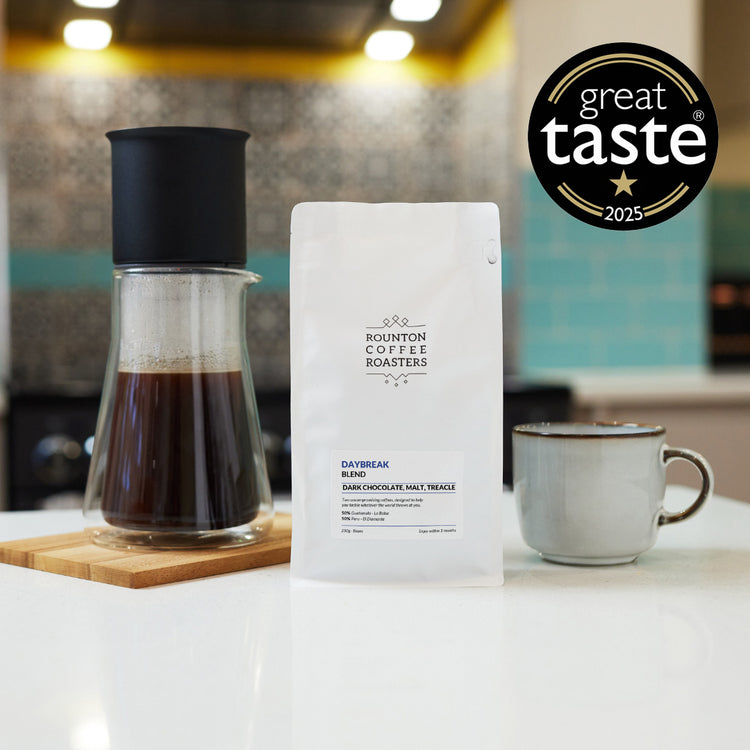BESTSELLER

Granary Blend
Flavour Notes:
Chocolate, Hazelnut, CaramelBrazil, Zambia, Uganda
£9.75
Rating:
BESTSELLER
Smallholder farmers from the Chirinos and Huabal districts come together to deliver their coffee to a central dry mill.
This lot is named after the city Chachapoyas, which is the capital of the neighbouring Amazonas region.
We give a lot of love and attention to our decaf coffees, and want them to taste just like their caffeinated counterparts. Like any good Peruvian coffee, you can expect notes of caramelised brown sugar, cocoa, and a cherry-like sweetness.
Praised by the Great Taste Award judges for its "immense amount of character, lovely dark chocolate and cherry notes".
.jpg?v=1634547647389&options=)
No caffeine, but no lack of flavour. These decaffinated coffee beans like to spend their time in the roaster, getting nicely developed without getting too bitter. The chemical-free decaffeination process means you'll still be able to enjoy the origin characteristics of this Peruvian coffee.
Sparkling Water Decaf
18g in, 36g out, extracted over 27(±3) seconds.
1:16 ratio, steeped for 4 minutes and left to settle. No plunger needed!
.jpg?v=1636539282608&options=)

.jpg?v=1638528034490)
We take our decaf pretty seriously, having met too many people who had given up trying to find one that tasted any good... The clean, chemical-free decaffeination process means that our decaf coffee beans will always taste like their caffeinated counterparts, and nothing else.
Winning two stars in the 2021 Great Taste Awards, the judges were particularly impressed with the "immense amount of character in this decaf and we get the lovely dark chocolate and cherry notes."
Everyone's setup is unique, but here are some good starting points.
We love how the world of coffee changes with the seasons. If you like this, take a look at some of our suggestions here - you might just find your new favourite.
BESTSELLER

Flavour Notes:
Chocolate, Hazelnut, CaramelBrazil, Zambia, Uganda
£9.75
Rating:
BESTSELLER

Decaf coffee is not completely caffeine-free, but it contains significantly less caffeine compared to regular coffee, typically around 2-5 milligrams per 8-ounce (240ml) cup. This is significantly less than regular coffee, which contains about 95 milligrams of caffeine per 8-ounce cup. So, decaf coffee contains only a small fraction of the caffeine found in regular coffee.
It's essential to note that the caffeine content in decaf coffee is not standardised, and it's best to check the specific product or consult the manufacturer's information if you need more precise details. If you are sensitive to caffeine or trying to avoid it altogether, decaf coffee can still provide a flavourful and aromatic option with much lower caffeine levels.
Our decaf is called Sparkling Water Decaf because of the decaffeination method used to take the caffeine out of the coffee beans. It is not fizzy coffee, don't worry!
The Sparkling Water method, also known as the Carbon Dioxide (CO2) method, is a natural and chemical-free process used to decaffeinate coffee.
The process begins with green coffee beans being immersed in water, allowing their pores to open as they expand, and making the caffeine mobile. Next, pressured carbon dioxide is introduced, combining with the water to create sparkling water. The CO2 acts as a magnet, extracting caffeine from the beans. The caffeine-rich sparkling water is drained into an evaporator, causing the caffeine to precipitate out of the water. This cycle is repeated until the caffeine content reaches a low level, meeting the criteria for decaffeinated coffee. Finally, the decaffeinated coffee beans are gently dried until they reach their original moisture content, making them ready for roasting.
This method is known for maintaining the original taste profile of the coffee beans, resulting in a delicious and smooth decaf coffee, which surprises everyone who tastes it.
Sparkling Water Decaf coffee features rich and indulgent tasting notes of dark chocolate, cherry, and brown sugar. These flavours combine to create a smooth and satisfying cup, perfect for those who love a full-bodied coffee without the buzz. Many of our customers comment that they can't tell it is a decaf due to the flavours and smoothness of the brew.
Choosing Sparkling Water Decaf coffee offers several benefits, including...
- Low caffeine
- Chemical-free process
- Rich flavour
- Health considerations
The coffee beans in our Sparkling Water Decaf come from Chachapoyas, Jaén in Peru, and is sourced from smallholder farmers in the Chirinos and Huabal districts. These farmers deliver their coffee to a central dry mill for processing. This lot is named after the city Chachapoyas, the capital of the neighbouring Amazonas region, known for producing high-quality coffee beans with distinct and rich flavours.
Yes, Sparkling Water Decaf coffee is excellent for iced coffee. Brew the coffee using your preferred method, allow it to cool, and then pour it over ice. The rich flavours of dark chocolate and cherry will create a refreshing iced coffee experience without caffeine.